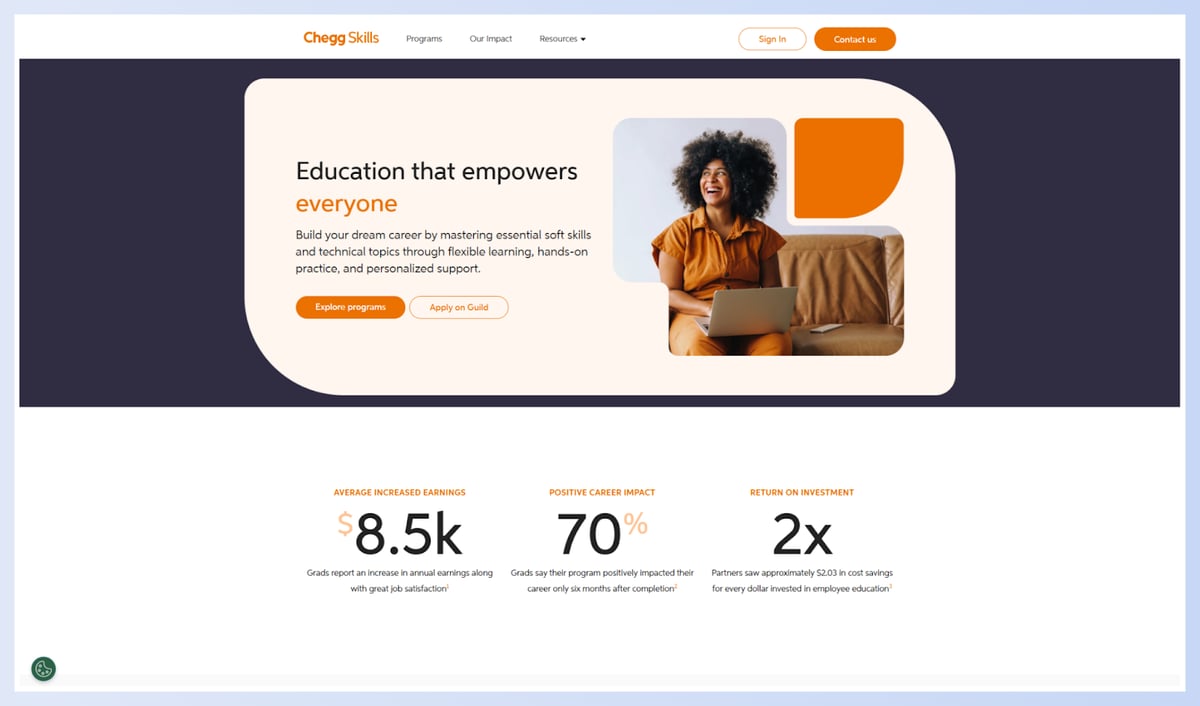Chegg Skills offers self-paced tech certificates, but mixed reviews and limited employer recognition raise questions about their career value. Before you invest in any online learning program, you need to understand what you're actually getting and whether it aligns with your career goals.
I've spent years building MentorCruise and watching thousands of professionals make education decisions. Some choose bootcamps. Others pick self-paced platforms like Chegg Skills. Many end up needing guidance after the course ends regardless of which path they chose. The pattern I've seen repeatedly is this: the platform matters less than the support system around it.
Why Understanding Chegg Skills Matters for Your Career

Chegg Skills sits in a crowded market of online learning platforms, and making the wrong choice can cost you months of wasted effort. The program promises job-ready skills in data analytics, UX design, and other tech fields through self-paced certificates. Whether that promise delivers depends on factors most reviews don't cover.
TL;DR
- Chegg Skills offers self-paced certificates in tech fields like data analytics and UX design, but employer recognition varies widely
- User ratings hover around 4.0/5, with common complaints about career services and job placement support
- The platform acquired Thinkful in 2020 and has faced financial challenges as a company, raising questions about long-term support
- Self-paced learning works best when paired with external accountability and guidance
- Consider whether you need a certificate or actual mentorship to reach your career goals
- MentorCruise offers ongoing support at $120/month with a free trial session, no long-term commitment required
Understanding Chegg Skills Quality and Value
The quality question comes down to what you're measuring. Chegg Skills courses teach legitimate skills. The video content is professionally produced. The curriculum covers real topics employers care about. But course quality and career outcomes are different metrics.
What is Chegg Skills bootcamp? It's a collection of self-paced certificate programs, primarily in data analytics, that Chegg acquired when they purchased Thinkful in 2020. The programs typically run 3-6 months depending on how fast you work through the material.
User ratings for Chegg Skills generally land around 4.0 out of 5 stars, though this varies by specific program and review platform. The positive reviews tend to focus on course content and flexibility. The negative reviews cluster around career services and post-completion support.
What Is Chegg Skills Bootcamp?
Chegg Skills positions itself as an affordable alternative to intensive bootcamps. You work through pre-recorded content, complete projects, and earn a certificate at the end. The self-paced structure means you can fit learning around a job or other responsibilities.
The program differs from live bootcamps in significant ways. No cohort-based learning. No real-time instruction. No built-in accountability beyond deadlines you set yourself. For some learners, this flexibility is exactly what they need. For others, it becomes a recipe for half-finished courses.
Chegg Company Background and Concerns
Why is Chegg struggling? The company built its reputation on homework help and textbook services, but those markets have faced disruption from AI tools and changing student behavior. Chegg's stock price dropped significantly in recent years, leading to cost-cutting across the organization.
This matters for Chegg Skills users because company financial health affects product investment. When companies cut costs, support teams shrink. Product updates slow down. Career services get fewer resources. I'm not saying Chegg Skills will disappear tomorrow, but understanding the parent company context helps you assess long-term risk.
What to Expect From Chegg Skills Programs

The Chegg Skills experience centers on self-directed learning with periodic check-ins. You log in, watch videos, complete assignments, and progress through modules at your own pace. The career services component, which promises job search support, is where expectations often diverge from reality.
Career Support and Services
Career services at Chegg Skills fall short of what most learners expect. The disconnect happens because people anticipate the kind of hands-on support that intensive bootcamps provide - regular coaching calls, resume reviews, interview practice, employer connections.
What Chegg Skills actually offers tends to be more limited. Access to career resources and templates. Some group sessions. Limited one-on-one support compared to higher-priced programs. If you're expecting someone to shepherd you through the job search, you'll likely be disappointed.
This is where I've seen the mentorship gap hit hardest. I built MentorCruise after watching peers spend $20,000 on bootcamps without landing jobs. The courses ended, the mentors disappeared, and people were left alone right when they needed guidance most. That pattern applies whether you're spending $500 or $20,000 on education.
Job Outcomes After Completion
Completing Chegg Skills gives you skills and a credential - not interview confidence, negotiation ability, or someone to help you handle rejection. The transition from certificate to job offer isn't automatic.
Some completers land roles quickly. Others spend months applying without success. The difference usually isn't the certificate - it's whether they have support during the job search itself.
The professionals I've watched succeed after any learning program share a pattern: they don't rely solely on the program's career services. They find mentors, join communities, get feedback on their job search approach. The certificate opens doors. Relationships and guidance help you walk through them.
Program Format and Structure
Is Chegg Skills self-paced? Yes, fully. You set your own schedule and move through content as fast or slow as you want. This works well if you're disciplined and have clear goals. It works poorly if you need external accountability.
The self-paced model has advantages. You can accelerate through topics you already understand. You can slow down on challenging material. You can learn around a job, family, or other commitments. But you trade structure for flexibility, and many learners underestimate how much structure helps them finish.
What is the format of Chegg Skills programs? Video lessons, readings, hands-on projects, and assessments. The projects are designed to build a portfolio you can show employers. The quality of the projects varies - some are genuinely useful for job applications, others feel more academic than practical.
How to Choose Between Learning Platforms

How to Choose Between Learning Platforms
Choosing between Chegg Skills and alternatives requires clarity about what you actually need. Is it skill acquisition? A credential? Accountability? Career guidance? Different platforms excel at different things.
How Chegg Skills Compares to Other Platforms
Chegg Skills vs Coursera: Coursera offers courses from universities and companies, often with more academic rigor. Coursera certificates tend to carry more weight with employers who recognize university names. Chegg Skills offers more structured programs aimed at specific career outcomes.
Chegg Skills vs LinkedIn Learning: LinkedIn Learning provides shorter courses focused on specific skills rather than career-changing programs. It integrates with your LinkedIn profile, which helps with visibility. Chegg Skills offers more depth but requires more commitment.
Chegg Skills vs Udemy: Udemy operates on a course-by-course model with massive variety and frequent sales. Quality varies enormously between instructors. Chegg Skills provides a more curated, structured experience but less flexibility to pick and choose.
The platform comparison most people skip is this: what happens after the course ends? All these platforms teach skills. Few of them provide ongoing support for applying those skills to your actual career. That's where the value proposition changes entirely.
We accept fewer than 5% of mentor applicants at MentorCruise because selectivity matters more than scale. A great learning platform combined with poor guidance produces lower job placement rates and longer time-to-first-role than mediocre content with excellent mentorship. I've seen this pattern repeatedly across thousands of mentorships.
Common Chegg Skills Complaints to Consider
Chegg Skills bootcamp complaints cluster around several themes:
Career services gaps: The job support promised doesn't match the job support delivered. Users expecting hands-on coaching find self-service resources instead.
Refund challenges: Chegg Skills refund problems appear in reviews, with some users reporting difficulty getting refunds even when they qualify under stated policies.
Pacing issues: Self-paced sounds appealing until you're six months in with half a program completed. Without external accountability, completion rates suffer.
Post-completion silence: Once you finish, the support largely ends. No ongoing mentorship. No continued career guidance. Just you and your certificate.
How to choose an online learning platform for upskilling comes down to honest self-assessment. Can you complete a self-paced program without external accountability? Do you need skill acquisition, or do you need someone to help you apply skills to your career? Is a certificate your goal, or is a job your goal?
Chegg Skills Costs and Investment
Is Chegg Skills worth it depends entirely on what you compare it against. The programs cost significantly less than intensive bootcamps, often under $500 for a full certificate. That's accessible. But cheaper doesn't mean better value if it doesn't help you reach your actual goal.
Is Chegg Skills Worth the Investment?
For most learners, no - the time and opportunity costs outweigh the limited career support you'll receive.
Time investment: Self-paced programs typically take longer to complete than structured programs. If you're trying to make a career move quickly, that time cost matters.
Opportunity cost: Six months spent on a program that doesn't lead to a job is six months you could have spent differently. The sticker price isn't the real cost.
Career services reality: If you're counting on Chegg Skills career services to help you land a job, factor in that you may need additional support. That additional support has its own cost - whether it's a career coach, a mentor, or time spent figuring things out alone.
Chegg Skills refund problems suggest doing your homework on the refund policy before enrolling. Understand exactly what qualifies for a refund and what the process requires. Don't assume you can easily get your money back if the program isn't what you expected.
The comparison I'd encourage you to make: $500 for a self-paced certificate with limited career support versus $120/month for ongoing mentorship with someone who's been where you're trying to go. We offer a free trial session with every mentor on MentorCruise so you can test the relationship before committing. Cancel anytime, no long-term commitment required.
The 97% satisfaction rate and 4.9/5 average rating we maintain comes from mentors who actually care about outcomes, not just course completion. Long-term mentorship relationships beat one-off transactions because career development isn't a one-time event.
Frequently Asked Questions
How Do I Get Hired After Chegg Skills Bootcamp?
Completing Chegg Skills is the start of your job search, not the end. Focus on three things: build a portfolio of projects that demonstrate your skills, network actively in your target field, and get feedback on your application materials from someone who hires in that area. The certificate matters less than your ability to demonstrate competence and fit.
Is Chegg Skills Self-Paced?
Yes, Chegg Skills programs are fully self-paced. You access pre-recorded content and complete assignments on your own schedule. This flexibility helps if you have other commitments but requires self-discipline. Many learners benefit from external accountability - a study group, a mentor, or scheduled check-ins - to stay on track.
What Are the Pros and Cons of Chegg Skills?
Pros: Affordable compared to intensive bootcamps. Flexible self-paced structure. Legitimate curriculum in growing tech fields. Projects for your portfolio.
Cons: Limited career services compared to premium programs. No cohort-based community. Post-completion support ends. Self-paced requires self-discipline many learners lack. Parent company financial challenges create uncertainty.
How Much Does Online Skills Training Cost?
Chegg Skills programs typically cost under $500 for a full certificate. Intensive bootcamps range from $10,000-$20,000. Individual courses on platforms like Udemy cost $10-$200 during sales. Ongoing mentorship through platforms like MentorCruise starts at $120/month with async messaging between sessions included.
How Do I Know If I Need a Mentor Instead of a Course?
If you have specific skill gaps and strong self-discipline, a course might be enough. If you're unsure about your direction, struggling with job search, or need accountability, a mentor provides more value. Most people need both - skill acquisition and guidance applying those skills. The question is which gap is larger for you right now.
What Should I Look For When Choosing a Learning Platform?
Look for alignment between the platform's strengths and your actual needs. Consider: completion support (do they help you finish?), career services (what exactly do they provide?), community access (will you learn with others?), and ongoing relationship (does support end when the course does?). Read reviews specifically from people with your background and goals.
Is Chegg Skills Accredited?
Chegg Skills certificates are not accredited in the traditional academic sense. They're industry certificates, not college credits. Employer recognition varies - some hiring managers value these certificates, others don't. The projects you complete and the skills you demonstrate typically matter more than the credential itself.







